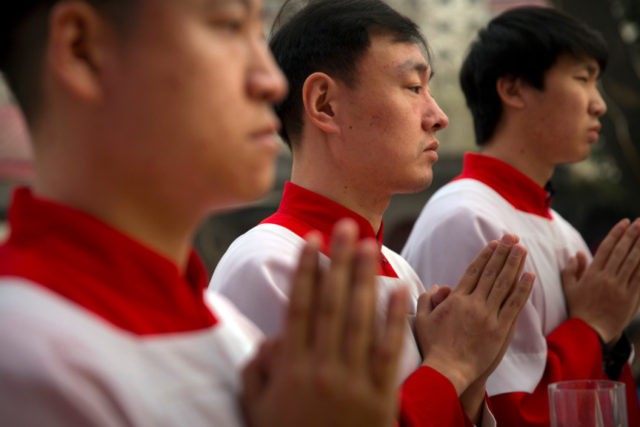Cardinal Raymond Burke said that the recent deal between the Vatican and China’s Communist Party was “absolutely unconscionable” in an interview with the Australian Sunday.
The agreement was “a betrayal of so many confessors and martyrs who suffered for years and years and were put to death” by the Communist Party, said Burke, a canon lawyer and the former head of the Catholic Church’s equivalent of the Supreme Court.
Under President Xi Jinping, the People’s Republic of China (PRC) has been progressively tightening its control over many aspects of life in China, notably religious practice. Since 2014, the government has demolished hundreds of crosses throughout China, closing churches and harassing worshipers.
“Christians in China are bracing themselves for the worst clampdown since the Cultural Revolution,” said Gina Goh, the regional manager of watchdog group International Christian Concern (ICC) earlier this month.
In testimony at a U.S. Congressional hearing in Washington in late September, China Aid founder Bob Fu said that the Communist Party’s “policies and principles for the management of religious affairs are returning to those evident in Mao’s era.”
Cardinal Burke said he could not explain why Pope Francis had agreed to such a deal with the PRC, which yielded some power over the appointment of bishops to the Chinese government. Burke said the church would never do such a thing for other secular leaders, such as Donald Trump or Scott Morrison.
The American cardinal was especially critical of statements by Argentinian Bishop Marcelo Sanchez Sorondo, the head of the Pontifical Academy of Social Sciences, that the Communist Chinese state was the best model of application of Catholic social teaching.
“That was a totally absurd declaration; atheistic communism is the antithesis of social justice,” Burke said.
Former U.S. Cardinal Theodore McCarrick, who carried on decades of homosexual abuse of priests and seminarians, was reportedly one of the central figures behind the China deal, acting on the Vatican’s behest.
“What I know is that McCarrick was the envoy, officially or unofficially, of the Church, maybe of Pope Francis,” said Henry Cappello, described as an “expert close to the situation.”
McCarrick himself had been a vocal advocate of a deal between Chinese President Xi Jinping and the Church under Pope Francis.
“I see a lot of things happening that would really open many doors because President Xi and his government are concerned about things that Pope Francis is concerned about,” McCarrick told The Global Times in February 2016.
The similarities between Pope Francis and President Xi could be “a special gift for the world,” McCarrick said.
Follow Thomas D. Williams on Twitter Follow @tdwilliamsrome

COMMENTS
Please let us know if you're having issues with commenting.